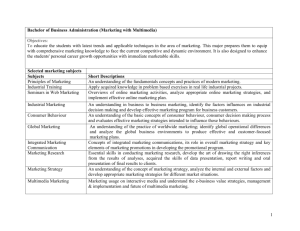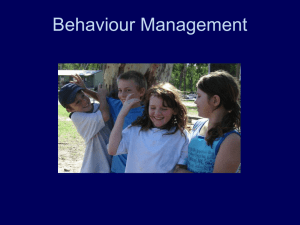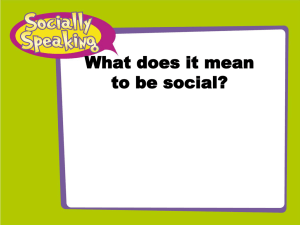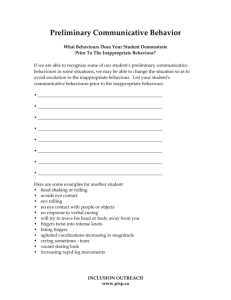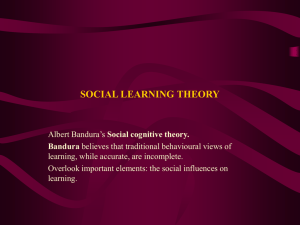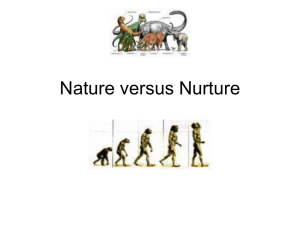CHAPTER 3 – THE BIOLOGICAL BASIS OF BEHAVIOUR
advertisement
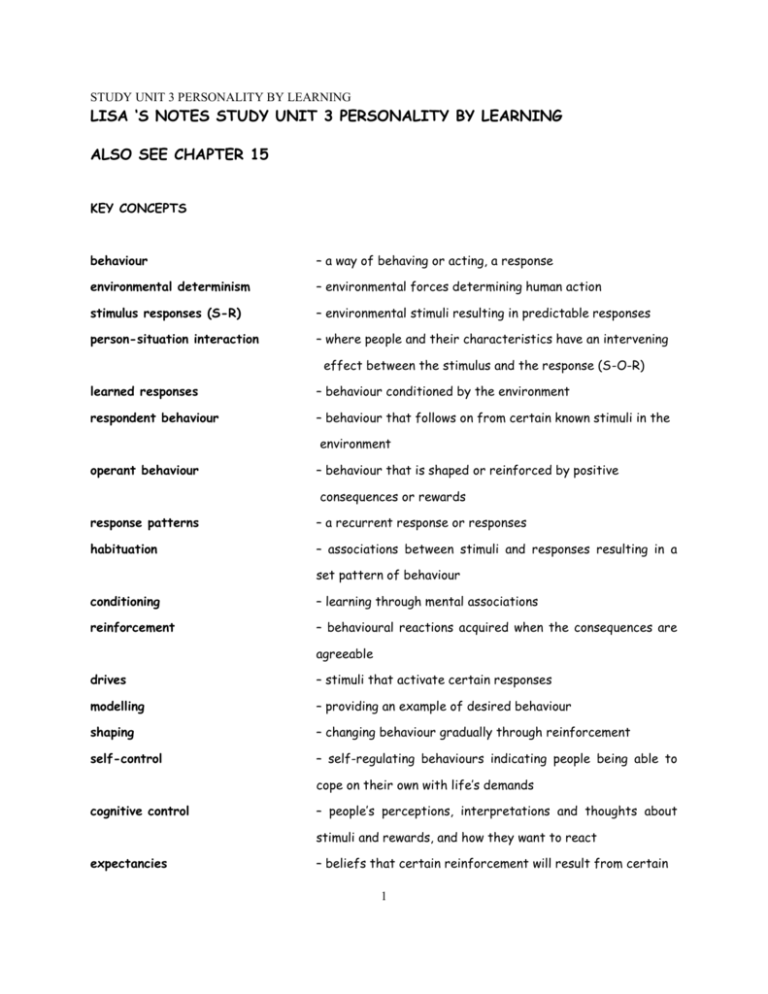
STUDY UNIT 3 PERSONALITY BY LEARNING LISA ‘S NOTES STUDY UNIT 3 PERSONALITY BY LEARNING ALSO SEE CHAPTER 15 KEY CONCEPTS behaviour – a way of behaving or acting, a response environmental determinism – environmental forces determining human action stimulus responses (S-R) – environmental stimuli resulting in predictable responses person-situation interaction – where people and their characteristics have an intervening effect between the stimulus and the response (S-O-R) learned responses – behaviour conditioned by the environment respondent behaviour – behaviour that follows on from certain known stimuli in the environment operant behaviour – behaviour that is shaped or reinforced by positive consequences or rewards response patterns – a recurrent response or responses habituation – associations between stimuli and responses resulting in a set pattern of behaviour conditioning – learning through mental associations reinforcement – behavioural reactions acquired when the consequences are agreeable drives – stimuli that activate certain responses modelling – providing an example of desired behaviour shaping – changing behaviour gradually through reinforcement self-control – self-regulating behaviours indicating people being able to cope on their own with life’s demands cognitive control – people’s perceptions, interpretations and thoughts about stimuli and rewards, and how they want to react expectancies – beliefs that certain reinforcement will result from certain 1 STUDY UNIT 3 PERSONALITY BY LEARNING behaviours in certain situations self-efficacy – a person’s belief that he/she does have the ability to attain a goal external locus of control – a person’s belief that he/she does not control the outcomes of his/her behaviour internal locus of control – a person’s belief that he/she controls the outcomes of his/her behaviour learned helplessness – people’s real or perceived inability to be in control of their lives faulty learning – incorrect ways of responding to stimuli self-handicapping – fearing success and failure behaviour modification – making partial changes to behaviour 15.1 Introduction Many examples of behaviour, both positive and negative, demonstrate the effect of learning on behaviour. Learning assumptions are applied in the field of psychological assessment, training, motivation, therapy, counselling and marketing psychology. The aim of the chapter is to explain how learning and related processes are involved in various personality processes, and to discuss their value in the work content. 15.2 A background to the behaviourist view of human nature The behaviourist’s view of humankind is related to beliefs that human behaviour can be controlled, manipulated and accurately assessed. Personality is characterised by patterns of responses that are learned and reinforced by influences in the environment. Behaviourists believe that people’s existence relies on being able to repeat behaviours that are needed in the environment. Socialcognitive theorists believe people can apply self-regulation. Behaviourists established learning principles and laws through accurate natural observation and experiments. Behaviourist theories are divided into two types: classical perspectives social-learning or social-cognitive theories. 2 STUDY UNIT 3 PERSONALITY BY LEARNING 15.3 The main assumptions of behaviourist theories 15.3.1 Observable behaviour Human personality can best be studied by means of the objective observation of external and observable behaviours. Observational methods involve controlled experiments and observations in natural settings, physical measurements of behavioural responses, and questionnaires. 15.3.2 How environment and situations shape behaviour Human behaviour is directed, controlled and formed by environmental and situational influences. People are conditioned to react in certain ways to various types of environmental stimuli. Stimuli from the environment may be simple or more complex, some may be well known to people and others not. Therefore some behaviourists acknowledge intrinsic or non-conscious factors in people to determine at least some behaviour. Behavioural genetics involves the study of both the environment and genetics. 15.3.3 Personality’s relationship to learned responses Learning is a conditioning process of controlling stimuli from the environment, people’s responses, and the rewards or punishment they get as a result of certain responses. This relationship is referred to as a stimulus-response (S-R) relationship, in other words stimuli influence the person so that he/she reacts with certain responses. However, the stimulus-organism-response (S-O-R) principle recognises that people and their characteristics have an intervening effect between a stimulus and a response. In this way, patterns of learned responses characterise a person’s personality. Therefore, past learning experiences influence present and future behaviour. As people develop, learned responses accumulate, enabling people to function on more complex levels. It is also possible for certain behaviours to be extinguished (unlearned) under certain conditions. 3 STUDY UNIT 3 PERSONALITY BY LEARNING 15.3.4 Self-control People are able to apply self-reinforcement through cognitive self-regulating behaviours. 15.3.5 Learning and unconscious factors Classical behaviourism did not recognise non-conscious factors in personality functioning. However later behaviourist writings concluded that non-conscious cognition occurs at a level of “unawareness”. 15.4 Response patterns in personality structure Behaviourists use various response concepts to indicate the consistent characteristics of personality. Responses are learned patterns of behaviour that characterise personality and are used by people to act on stimuli and in situations. Consistency in behaviour is referred to as “response tendencies”. Respondent behaviour is the result of certain known stimuli from the environment. The stimuli that really force responses from people are those internal to people because of their biological nature. Positive reinforcers are mostly used to structure people’s behaviours, but negative reinforcers can also be used to make people avoid certain types of behaviour. In contrast to respondent behaviour, operant behaviour has an influence on the environment. These response tendencies are the result of learning experiences and can be related to many types of stimuli or situations. A variation of the response idea is the concept of habit, which refers to the association of stimuli and responses to form specific recurrent behaviour patterns. Adult behaviours are learned habits that are activated by primary and secondary drives. Habits are formed, maintained and discarded by reinforcement. Structural concepts in learning (such as responses, habits and control patterns) function as similar concepts as: the ego or self in psychoanalysis 4 STUDY UNIT 3 PERSONALITY BY LEARNING constructs in cognitive theories traits in trait theory. 15.5 Motivation Motivation is explained through reinforcement, primary and secondary drives, habits, and various concepts that indicate cognitive control. 15.5.1 Reinforcement Behaviour is motivated and directed by conditioning or reinforcement processes in the learning responses. Reinforcement of behaviours is shaped through positive reinforcement such as praising an employee. Positive reinforcement stimuli will cause such behaviours to be repeated. If certain behaviours do not serve a purpose anymore or are continually discouraged, responses could be extinguished. In training, the principle of reinforcement shaping is applied when employees are trained to execute tasks in stages. 15.5.2 Habituation The formation of habits is the simplest form of learning and motivated behaviour. Habits can become ingrained when initial stimuli are frequent, important or coupled to emotions. 15.5.3 Drives as activators Drives are stimuli that activate responses from people. Drives are internally biological, but also acquired social states. They cause tension or stress that motivates people to act in ways to reduce, dismiss or change the tension. Therefore, drive theories emphasise homeostasis (creating stability in behaviour). 15.5.4 Conditioning processes Classical conditioning occurs when a response is caused by a specific identifiable stimulus. Such responses are mostly automatic. Operant conditioning, however, can be regarded as reward or consequence learning. People do not react only passively to stimuli or their environment. Responses may be shaped and maintained because of the effects, rewards or value of the 5 STUDY UNIT 3 PERSONALITY BY LEARNING association between stimuli and responses. 15.5.5 Person-environment interaction, cognitive control and behaviour regulation The strongest argument for motivation is the influence of various types of environmental factors and the person’s interaction in and with the environment. People have freedom to influence the environment and regulate their own behaviour. The social-cognitive perspective emphasises that behaviour is reciprocally influenced by feelings, thoughts, physiological processes and consequences of behaviour. 15.5.5.1 Positive behavioural concepts Psychological situations (signature situations) are situations that are relevant to a person and his/her behaviour. Cognitive control involves a situation whereby people perceive, interpret and think about stimuli, rewards and how they want to react. Cognitive control enables people to expect and predict outcomes, as well as which behaviours to use in which situations. Central to the idea of being in control of the consequences of behaviour is the concept of expectancies, whereby people believe that certain reinforcement will result from certain behaviours in certain situations. The concept of the locus of control explains people’s expectancies that outcomes of their behaviour can be or are controlled. An internal locus of control occurs when people believe that they have control of their accomplishments because of their competencies. In contrast, people whose behaviour is reinforced by expectancies that their accomplishments are ruled by luck, fate, other people and circumstances have an external locus of control. Self-efficacy concerns people’s convictions that they are competent at achieving or producing the expected outcomes. Self-efficacy concerns people’s self-evaluation and intrinsic motivation to be in control and to realise their potential. Vicarious learning is social learning that comes from observing others (models) while they 6 STUDY UNIT 3 PERSONALITY BY LEARNING perform certain behaviours. Vicarious learning emphasises experiential learning whereby people correct themselves by self-criticism or give self-praise. In contrast to self-efficacy and an internal locus of control, the concept of learned helplessness indicates people’s real or perceived inability to be in control of their lives in general or during specific events. Learned helplessness could result from negative reinforcement of self-control or a perception of helplessness. The fear of success and failure is called a self-handicapping psychological fear. 15.6 Learning in personality development Key concepts in learning-development approaches are social reinforcement, critical situations, identification, modelling and imitation. Learning theories view personality development as continuous learning through reinforcement processes. People will repeat certain behaviours in certain situations if they experience positive reinforcement, but avoid stimuli and behaviours that elicit negative reinforcement and unpleasant consequences. Over time people develop contingencies that apply to certain situations. Personality is shaped by various forms of learning, such as formal education in schooling systems and at home, but also by informal life experiences. Development does not take place in stages, but is a continuous lifelong process as a result of the interaction between people and their environments. Most human behaviours are learned through classical and operant conditioning. Classical conditioning is associated with involuntary behaviour and many negative responses can be unlearned by classical conditioning. Operant conditioning is a form of behaviour modification through progressive and controlled rewards if certain behaviours occur. At home, school and work, performance can be facilitated by a system of token economy whereby certain rewards will be allocated only if certain behaviours occur. 7 STUDY UNIT 3 PERSONALITY BY LEARNING Children develop through the imitation of parents and many other models in their social environment. Much learning takes place as a result of cognitive processes such as thinking, perception, interpretation and anticipation. In this respect, competency can be described as the developed cognitive ability to perform behaviours that will suit the demands of situations. 15.7 Learning and psychological health Psychological maladjustment is viewed as unadapted habits and a lack of life skills and knowledge owing to faulty learning and inappropriate reinforcement. Psychologically healthy people, however, have correctly learned to react so as to receive positive reinforcement and avoid negative stimuli and behaviours with unpleasant outcomes. Operant conditioning can be responsible for behaviour deficiencies as a result of incorrect reinforcement. People will behave in deficient ways if they are rewarded for it. Depressive people’s behaviours are caused by insufficient reinforcement from their environment and other people. This low level of reinforcement results in pessimistic thinking and emotional outbursts. In this way, people may learn to act in a self-defeating manner that prevents them from getting positive reinforcement. 15.8 Summary and conclusion Behaviourist and learning assumptions are simple, understandable and have face validity in their statements on behaviour that is observable and measurable. Behaviourism has contributed much to the development of objective methods to observe and assess personality. In work motivation, leadership behaviour, training and behaviour-modification practices, learning principles offer economic and quick ways to impact on human behaviour. 8
